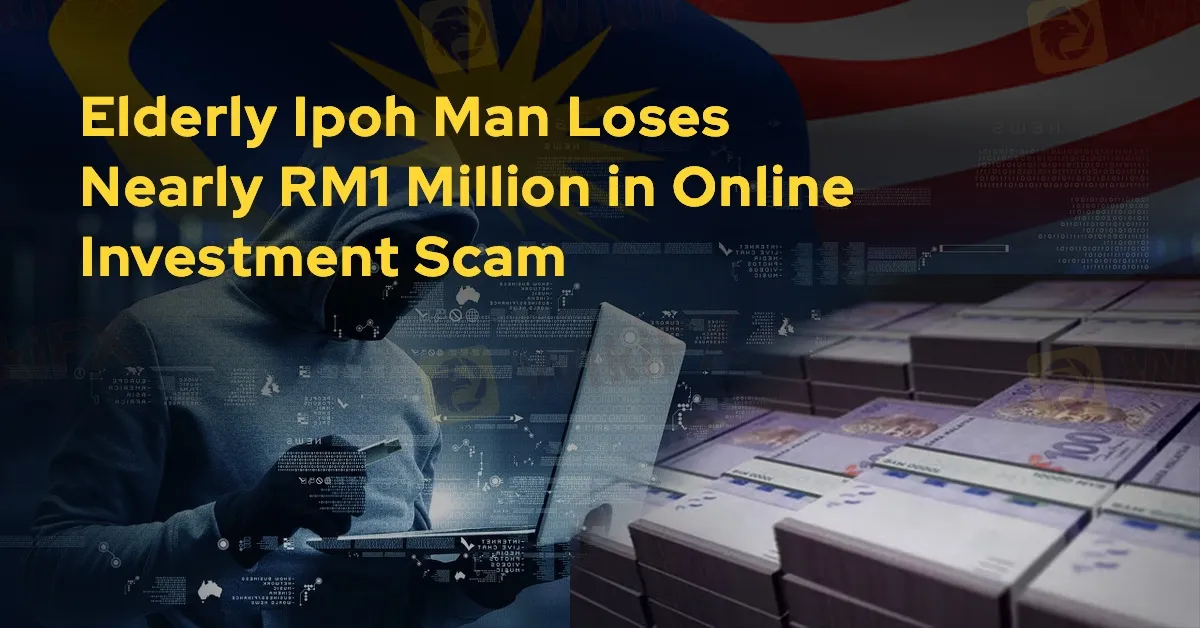Elderly Ipoh Man Loses Nearly RM1 Million in Online Investment Scam
Abstract:An elderly man in Ipoh, Malaysia, has fallen victim to an online investment scam, losing RM974,000 in the process. The 67-year-old’s ordeal came to light after he lodged a report with the Ipoh district police on January 11, 2025.

An elderly man in Ipoh, Malaysia, has fallen victim to an online investment scam, losing RM974,000 in the process. The 67-year-olds ordeal came to light after he lodged a report with the Ipoh district police on January 11, 2025. Acting Perak police chief DCP Zulkafli Sariaat confirmed the case in a public statement.
The victim first encountered the fraudulent scheme on Facebook on December 4, 2024. While browsing the platform, he saw an advertisement for a stock investment opportunity that promised a 20 per cent return on an initial RM5,000 investment within just 30 minutes. The seemingly lucrative offer caught his attention, leading him to click on the provided link.

The link, shared by a female suspect, directed the victim to a WhatsApp group named the “National Malaysian Finance Management Association.” He was subsequently instructed to download an app called PGLO.PRO. Convinced by the promises of high returns, the victim made 16 online payments amounting to RM974,000, transferring the funds to three different bank accounts.
The deception came to light in January 2025, when the victim conducted a Google search and discovered that the investment scheme was non-existent.
DCP Zulkafli urged the public to exercise caution when dealing with investment opportunities, particularly those promising unusually high or quick returns. He emphasised the importance of verifying whether the companies involved are registered with regulatory bodies such as the Securities Commission Malaysia, Bank Negara, or the Companies Commission of Malaysia.

Unregulated or suspicious investment offers, especially those advertised on social media, pose a significant risk to unsuspecting investors. To mitigate such risks, individuals are encouraged to use platforms like WikiFX, a global broker regulatory query tool available on Google Play and the App Store.
WikiFX provides essential information about brokers, including their regulatory status, user reviews, and safety ratings. The platform enables potential investors to verify the legitimacy of financial entities before committing their money. Its comprehensive database, risk alerts, and regulatory updates offer an added layer of protection, empowering users to make informed financial decisions. By leveraging tools like WikiFX, investors can safeguard their hard-earned savings and avoid the devastating consequences of fraudulent investment schemes.

Read more

Exposed: Deceptive World of Fake Trading Gurus – Don’t Get Fooled!
The internet is inundated with advertisements and promotions from self-proclaimed trading gurus who promise to teach you how to become a successful trader and earn a substantial secondary income. These individuals often claim that their trading techniques can make you rich, even if you have zero experience. However, these assertions are typically false, and many people fall victim to these scams. This article aims to expose these fake trading gurus, explain how they operate, and provide tips on how to avoid being scammed.

Navigating the Intersection of Forex Markets, AI Technology, and Fintech
The financial world is transforming, driven by the rapid integration of artificial intelligence (AI) and innovative fintech solutions. This change is most apparent in forex markets, where algorithmic trading and deep learning are redefining strategies, risk management, and decision-making. In this article, we explore how AI-driven technologies are not only revolutionizing forex trading but are also propelling fintech innovations that enhance customer experiences, bolster security, and unlock new market opportunities.

The One Fear That’s Costing You More Than Just Profits
The fear of missing out (FOMO) is NOT what you think it is! Read the three lesser-discussed components that contribute greatly to FOMO trading!

Lost Money to Scam Recently?! This Article Could Help You!
The rise of online trading has brought unparalleled opportunities for investors worldwide. However, alongside legitimate platforms, fraudulent brokers continue to exploit unsuspecting individuals, luring them with promises of high returns and exclusive investment opportunities. For those who have fallen victim to such schemes, the pressing concern remains: is there a path to recovering lost funds?
WikiFX Broker
Latest News
How Crypto Trading Transforms FX and CFD Brokerage Industry
UK would not hesitate to retaliate against US tariffs - No 10 sources
Navigating the Intersection of Forex Markets, AI Technology, and Fintech
Exposed: Deceptive World of Fake Trading Gurus – Don’t Get Fooled!
The One Fear That’s Costing You More Than Just Profits
Rate Calc
